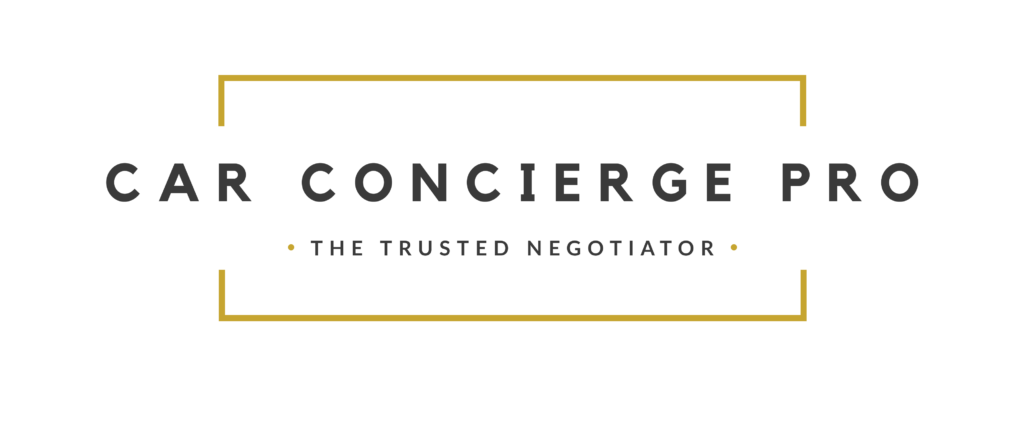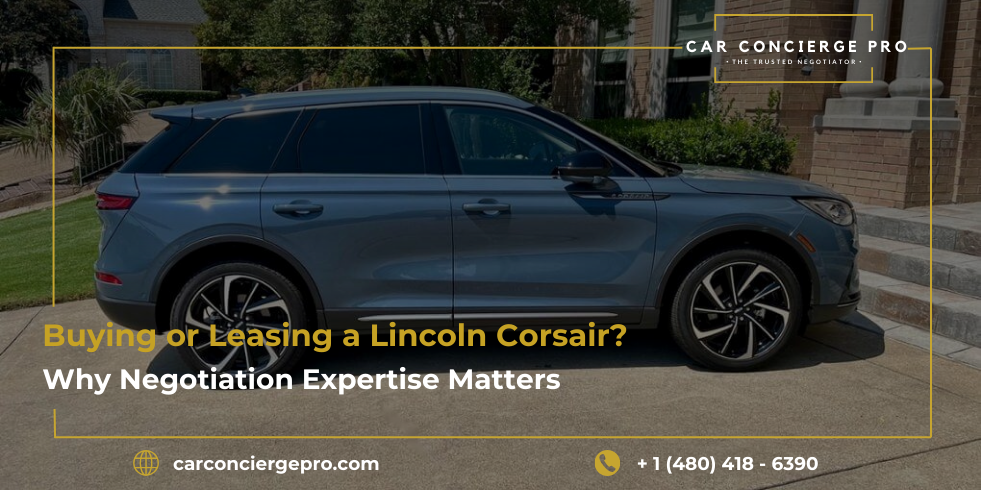The Lincoln Corsair is one of the most attractive luxury compact SUVs on the market, merging refined style, smooth performance, and a quiet ride. But when you’re ready to drive one home, a vital question arises: Should you buy or lease? Each option carries unique financial implications, and your success often depends less on the MSRP sticker and more on your ability to negotiate effectively. Whether you plan to purchase the Corsair as a long-term family vehicle or lease it for a few years of luxury, negotiation determines how much you actually pay versus how much you could save. This guide explains both options, highlights common pitfalls, and shows how effective negotiation can turn a potentially expensive decision into a wise investment.
For many shoppers in the luxury SUV segment, the decision goes beyond affordability and enters the realm of lifestyle. Buying a Lincoln Corsair may appeal to drivers who want to build equity, avoid mileage caps, and hold onto a premium vehicle for five years or more. Leasing, on the other hand, caters to those who value flexibility, want lower monthly payments, and prefer upgrading to the latest models every few years. Both choices can look attractive on paper, but the real winner is determined by the deal you negotiate at the dealership.
Dealership offers often seem straightforward but can be layered with incentives, financing terms, and hidden fees that confuse buyers. That’s why negotiation expertise isn’t just about lowering the sticker price—it shapes the structure of your contract, impacts financing rates, and defines the total cost of ownership or leasing. Without careful research and confidence at the table, you risk paying significantly more over time, even if your monthly payment looks manageable.
This is especially true in the case of luxury vehicles like the Lincoln Corsair, where dealer markups, residual values, and lease factors can vary widely. A buyer who is well-prepared and uses the appropriate negotiating strategy can save thousands of dollars, steer clear of expensive blunders, and make sure that every dollar spent yields the most value. In the sections that follow, we’ll compare buying versus leasing, uncover hidden pitfalls, and show how negotiation transforms an average deal into a savvy financial decision.
Introduction to the Lincoln Corsair
The Lincoln Corsair, introduced as a successor to the Lincoln MKC, sits comfortably in the premium compact SUV class. With elegant styling, advanced infotainment, and a suite of driver-assist technologies, it has quickly become a favorite among luxury SUV enthusiasts. Positioned to deliver refinement without sacrificing practicality, the Corsair competes with models like the Audi Q5, Mercedes-Benz GLC, and BMW X3, offering buyers a more serene and uniquely American alternative.
Buyers are often drawn to:
- A quiet cabin with Lincoln’s signature focus on serenity, ensuring that road noise is minimal even at highway speeds. This creates a cocoon-like driving experience, ideal for long commutes and road trips.
- The available plug-in hybrid trim for fuel-efficient driving, balancing eco-conscious technology with strong performance. Drivers looking to reduce fuel costs without losing luxury find this option especially appealing.
- A generous warranty and premium dealer servicing perks that underline Lincoln’s commitment to ownership satisfaction. Complimentary service visits and pick-up/drop-off programs add convenience that rivals struggle to match.
But beneath all the luxury lies a decision every prospective owner must make: how to finance or lease it in a way that maximizes value. While the vehicle itself appeals to comfort, technology, and prestige, the financial structure of your deal determines long-term satisfaction. Choosing the wrong path can result in higher costs, strained budgets, or missed savings opportunities. This makes negotiation expertise essential—not just for securing favorable terms, but for aligning your Corsair ownership or lease with your lifestyle, driving habits, and financial goals.
Buying vs Leasing a Lincoln Corsair – Key Differences
What Buying Means in Practice
Buying a Lincoln Corsair means full ownership, either through cash or financing. You’ll build equity and eventually own it outright. Monthly payments are initially higher than leasing, but resale value offsets costs over time.
Ownership also provides long-term flexibility—you can customize the vehicle, drive unlimited miles without penalty, and decide when and how to sell or trade it. For many buyers, purchasing a Corsair represents not only a financial investment but also the freedom to keep the SUV for as long as it continues to meet their needs.
What Leasing Involves
Leasing lets you drive the Corsair for a set term, usually 24–36 months, with lower monthly payments. At the end, you return it unless you negotiate a buyout based on its residual value. This offers flexibility, but without equity accumulation.
Another major advantage of leasing is that most Corsair leases fall within the manufacturer’s warranty period, meaning you’re less likely to face large repair bills. Scheduled maintenance, roadside assistance, and even gap coverage are often included, protecting you from unexpected costs during your lease term.
Leasing also appeals to drivers who enjoy having the latest luxury features without long-term commitment. At the end of your contract, you can upgrade to a newer Corsair or even switch brands, keeping your driving experience fresh while avoiding issues like aging technology and depreciation.
Why Negotiation Expertise Makes a Difference
Your negotiation skills directly affect the overall cost of your Lincoln Corsair. By securing larger incentives, lower interest rates, or removing hidden fees, even small adjustments to financing or lease terms can save you thousands over the life of the contract.
How Prices Are Structured in Luxury SUV Deals
Lincoln Corsair pricing includes MSRP, dealer invoice cost, and often hidden markups. Finance managers build deals around adjusted cap costs, money factors, or APRs. Understanding these terms empowers negotiation.
Dealers often rely on the “monthly payment focus” strategy, where they try to distract buyers from the actual cost by only discussing affordable-looking payments. While it may seem convenient, stretching the loan or lease term can mean paying more in interest or depreciation over time. Recognizing the breakdown of each factor allows you to challenge inflated numbers.
Another key component is dealer add-ons such as extended warranties, paint protection, or inflated documentation fees. These extras are often high-margin profit centers for dealerships and can significantly increase your total cost. By knowing what’s optional versus essential, you can strip your deal down to its real value and avoid overpaying.
Dealer Tactics You Should Recognize
When negotiating for a Lincoln Corsair, it’s important to understand that dealers use subtle tactics designed to maximize their profit and minimize your leverage. These strategies often look harmless on the surface, but can significantly increase the total cost of ownership or leasing if not spotted early. Staying alert to these methods helps you counter effectively.
- Anchor you on monthly payment targets rather than total price. This shifts focus away from the overall deal, making longer terms and higher interest rates less noticeable. Always negotiate the purchase price first.
- Push add-ons like gap insurance or extended warranties. While some extras can add value, many are overpriced at the dealership and can usually be purchased elsewhere for less.
- Offer low-ball trade-in values to offset discounts. A dealer may reduce the vehicle’s sticker price but make up for it by undervaluing your trade-in. Independent quotes and online tools will protect you here.
The Role of Incentives and Rebates
Lincoln often offers lease cash incentives, loyalty savings, or low APR financing programs. Spotting and leveraging these deals maximizes bargaining power.
Incentives can vary widely depending on the time of year, your location, or whether you’re a returning Lincoln customer. For example, year-end clearance events often include larger cashback offers or special financing rates, while loyalty bonuses reward repeat buyers with exclusive savings. Knowing when these promotions are active allows you to plan your purchase or lease more strategically.
Additionally, incentives don’t always have to come directly from Lincoln itself. Dealers may have region-specific discounts, conquest bonuses for switching from a competitor brand, or hidden rebates that aren’t heavily advertised. Asking upfront and showing you’ve done your research ensures you capture every available program, reducing your overall cost significantly.
Buying a Lincoln Corsair – Pros, Cons, and Pitfalls
Buying a Lincoln Corsair provides the security of full ownership and the ability to drive as much as you want without lease restrictions. However, it also brings higher upfront costs and the long-term responsibility of maintenance after warranties expire. Careful budgeting and negotiation are key to ensuring that your investment truly pays off.
Advantages of Buying
- Ownership builds long-term equity. Instead of monthly payments going to a lease contract, each installment adds to your asset. Once the loan is paid, you own the vehicle outright, providing years of payment-free driving.
- Freedom to drive unlimited miles. Unlike leases with strict mileage caps, ownership allows you to travel as much as you want. This makes buying ideal for commuters, long-distance drivers, or families who enjoy frequent road trips.
Disadvantages of Buying
- Higher monthly payments compared to leasing.
Larger installments are typically required when financing a purchase, which may put additional pressure on your monthly spending plan. For buyers seeking lower payments, leasing often appears more attractive. - Vehicle depreciation hits hardest in the first years. The Lincoln Corsair can lose significant value in the first 2–3 years, which impacts resale potential. Buyers who sell too soon may face heavy financial losses.
- Risk of maintenance costs post-warranty. After the factory warranty expires, repair and upkeep expenses fall entirely on the owner. Luxury parts and labor for premium SUVs can quickly add up, making long-term ownership more costly.
Common Buyer Mistakes
Not researching fair purchase price or financing terms often leaves buyers paying thousands more over a loan’s lifespan. Many also overlook additional costs such as taxes, fees, and extended warranties, which can inflate the final price. Rushing into a deal without comparing multiple dealerships often results in missed discounts. Finally, focusing only on the monthly payment instead of the overall cost of ownership can lead to long-term financial strain.
Leasing a Lincoln Corsair – Pros, Cons, and Pitfalls
Leasing a Lincoln Corsair provides flexibility and lower monthly payments, but it also comes with mileage limits and no equity at the end of the term. It’s a great option for those who value driving a new luxury SUV every few years, but it’s less ideal for drivers planning to keep their vehicle long-term. Careful attention to lease terms, fees, and mileage allowances is essential to avoid unexpected costs.
Advantages of Leasing
- Lower monthly payments than buying. Leasing typically requires less money up front and reduces monthly expenses compared to financing. This allows drivers to enjoy a premium SUV at a more budget-friendly rate.
- Flexibility to upgrade every few years. At the end of the lease term, you can return the Corsair and move into a newer model with the latest features. This keeps your driving experience fresh without worrying about resale or depreciation.
- Warranty coverage during lease protects against big repair bills. Since most leases align with the manufacturer’s warranty period, costly repairs are rarely your responsibility. This provides peace of mind and helps you avoid major out-of-pocket expenses.
Disadvantages of Leasing
- Mileage restrictions with penalties. Most leases limit you to 10,000–12,000 miles per year, and exceeding that can result in costly charges. This makes leasing less suitable for long-distance commuters or frequent travelers.
- No equity at the end of the lease. Unlike buying, your payments don’t build ownership, and you return the vehicle once the lease ends. This means you’ll always have a car payment if you keep leasing.
- Potential wear-and-tear fees. Excess scratches, dents, or interior damage can lead to end-of-lease penalties. Keeping the Corsair in good condition is essential to avoid surprise charges.
Common Leasing Mistakes
Failing to negotiate the adjusted cap cost leads to overpaying. Many accept the dealer’s first lease structure without questioning residual value markup. Another frequent mistake is ignoring hidden fees like acquisition or disposition charges that substantially impact total costs. Some lessees also underestimate their annual mileage, leading to expensive penalties at the end of the lease.
Negotiation Strategies for the Lincoln Corsair
Effective negotiation is about more than just lowering the sticker price—it’s about understanding the full structure of the deal. By preparing in advance and questioning every number, you gain leverage and ensure long-term savings on your Lincoln Corsair.
Research Residual Values and Incentives
If residual values are set at 55% after 36 months, but the dealer inflates the money factor, your lease cost can rise unnecessarily. Always compare manufacturer incentives online before signing.
Residual values largely determine your monthly payment, so understanding them gives you the upper hand. A higher residual means lower depreciation costs, resulting in a cheaper lease overall. Checking independent lease calculators can help verify if the dealer’s terms are truly competitive.
Timing Your Deal for Better Discounts
End-of-month, end-of-quarter, and model-year-end clearance periods increase your leverage. Dealers are often under pressure to meet sales targets, which makes them more willing to negotiate deeper discounts. Shopping during holiday sales or special promotional events can also unlock additional incentives that aren’t available year-round.
Trade-In Considerations
Bring multiple online trade-in quotes before negotiation. This prevents the dealership from undervaluing your old vehicle while appearing to discount the Corsair.
It’s also smart to separate your trade-in discussion from the new car deal to avoid confusion and ensure you’re getting a fair price. By knowing your vehicle’s true market value, you can use it as leverage or even consider a private sale if the dealership’s offer falls short. This approach helps maximize savings on your Lincoln Corsair purchase or lease.
size=1 width=”100%” align=center>
Cost of Ownership vs Cost of Leasing – A Comparative View
Comparing ownership to leasing highlights the trade-off between long-term value and short-term affordability. Ownership builds equity and can be more cost-effective over several years, while leasing provides lower immediate payments and flexibility. Understanding your driving habits and financial goals is essential to choosing the best option.
Example Monthly Payment Scenarios
A $45,000 Corsair with 36-month financing at 5% APR requires about $1,350/month if paid in 3 years. A comparable 36-month lease with incentives may be $550–$600/month.
Long-Term Equity Considerations
Over six years, buying builds ownership, while leasing continuously resets payments. Buyers who keep vehicles long-term often come out ahead—provided they negotiated favorable purchase terms upfront. Equity also allows flexibility when upgrading, since you can use your Corsair’s resale or trade-in value toward your next purchase. Unlike leasing, it turns years of payments into an asset rather than an ongoing expense.
Practical Tips When Dealing with Lincoln Dealerships
Questions to Ask Sales Staff
- What’s the dealer invoice price on this Corsair trim?
- What manufacturer incentives am I eligible for?
- Can you match or beat financing rates from my bank?
Numbers You Should Have Prepared
- Know your credit score bracket.
- Research current program APRs and lease residuals.
- Prepare trade-in valuation evidence before walking in.
Mini-Summary – Buying vs Leasing a Lincoln Corsair
- Buying is best if you want ownership, high annual mileage freedom, and long-term savings.
- Leasing is best if you prefer lower payments, always having a new vehicle, and warranty peace of mind.
- In both scenarios, negotiation directly determines whether you overpay or achieve a smart deal.
Conclusion – Making Your Smartest Move
The Lincoln Corsair is a refined SUV that demands smart financial handling. Whether you buy or lease, your experience at the dealership will hinge less on advertised prices and more on negotiation skills. With strategic timing, research into incentives, and a refusal to accept first offers, you can step into your Corsair with confidence—knowing you made a deal that balances luxury with financial prudence.
Ultimately, the smartest move is aligning your decision with your long-term goals and lifestyle. If you prioritize flexibility and lower payments, leasing may be the right choice; if equity and ownership matter, buying offers stronger value. With sharp negotiation and informed planning, either path leads to a rewarding Lincoln Corsair experience.
FAQ
- Is it better to buy or lease a Lincoln Corsair?
It depends on your financial goals and driving habits. Buying the Lincoln Corsair makes sense if you plan to own it long term and drive higher annual mileage, since you’ll avoid lease restrictions. If you want warranty coverage, reduced monthly payments, and the option to update every few years, leasing is a better option. - How much should I negotiate on a Lincoln Corsair?
You should aim for at least 5–8% off MSRP when purchasing, though greater discounts may be possible during seasonal promotions. For leasing, focus on reducing the adjusted capitalized cost instead of only the monthly payment. Negotiating the money factor, fees, and trade-in value can save you thousands over the term. - Are Lincoln Corsair leases worth it?
Leasing a Lincoln Corsair can be worth it if you value driving a new luxury SUV every 2–3 years without worrying about high maintenance costs. Lease payments are usually much lower than financing, freeing up your monthly budget. Just be sure to stay within mileage allowances; otherwise, excess charges can offset savings. - What incentives are available for the Lincoln Corsair?
Lincoln frequently offers seasonal promotions such as cash rebates, loyalty or conquest bonuses, and low APR financing specials. Lease programs sometimes include bonus cash to encourage short-term contracts. Always check regional offers, since incentives often vary by location and time of year. - Does negotiating really matter with a Lincoln Corsair?
Yes, negotiation plays a major role in reducing the true cost of ownership or leasing. Dealers often mark up money factors, add unwanted extras, or lowball trade-in values unless challenged. A smart negotiation process can cut costs across multiple areas, often saving thousands over the contract term. - What costs are hidden in Lincoln Corsair leases?
Hidden lease costs often include acquisition fees, disposition fees, and wear-and-tear penalties at the end of the lease. Some dealers may also add marked-up services such as gap insurance or excess protection. Understanding each fee in advance allows you to negotiate or budget correctly. - When is the best time to buy a Lincoln Corsair?
The best times are typically at the end of the calendar year, end of the quarter, or when the next model year is about to arrive. Dealerships often offer higher discounts to clear remaining inventory during these periods. Shopping at these times gives you greater leverage for negotiation.





